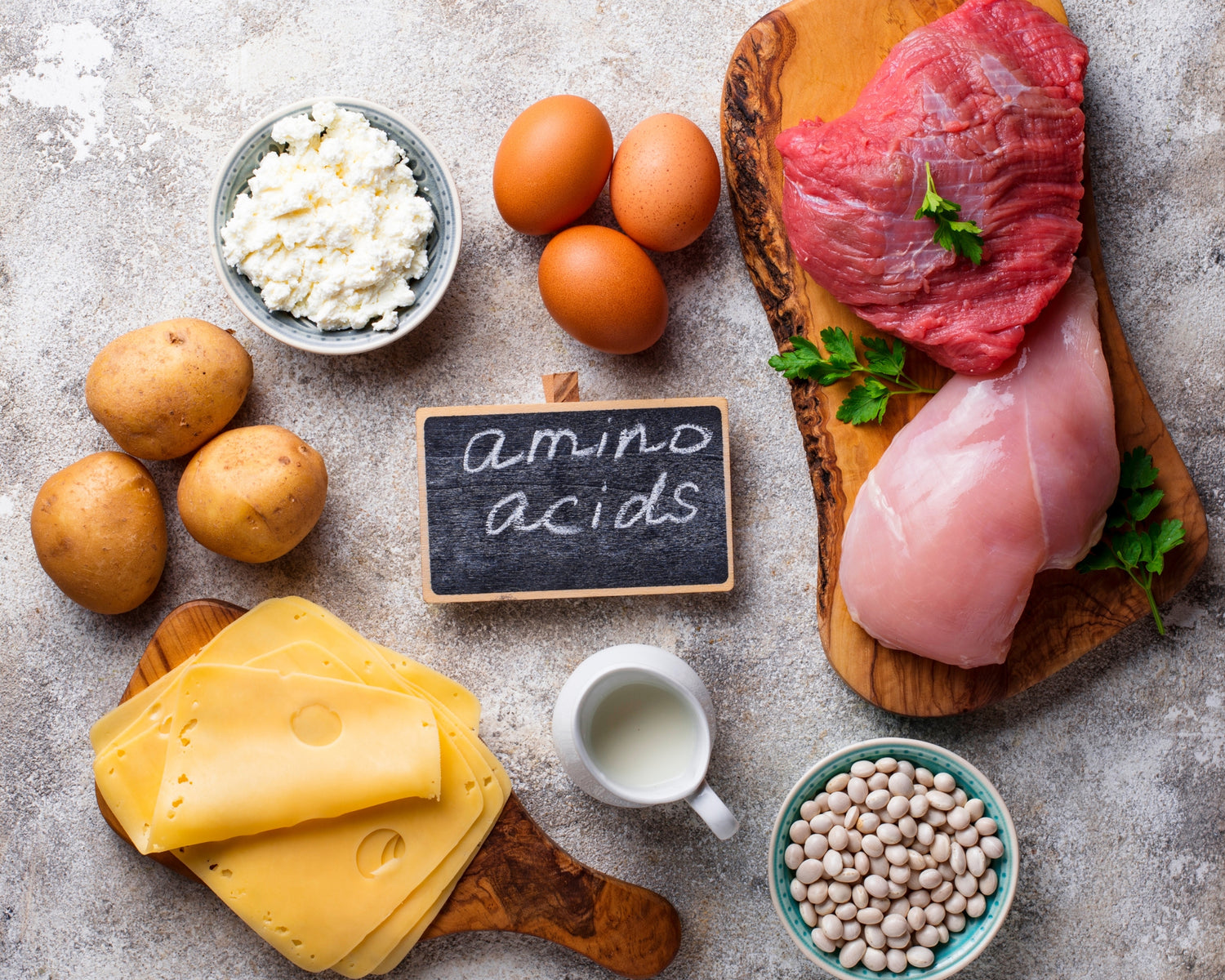Amino acids are organic compounds that serve as the building blocks of proteins. Proteins are essential macromolecules that play crucial roles in various biological processes in all living organisms. Each protein is composed of a specific sequence of amino acids, linked together through peptide bonds to form long chains known as polypeptides.
TYPES OF AMINO ACIDS
There are 20 standard amino acids that are commonly found in proteins (classified as essential, and non-essential).
These 20 amino acids are the fundamental components that combine in different sequences to form all the variety of proteins found in living organisms, and our human body. The specific arrangement of amino acids in a protein sequence dictates its unique structure and function, the structure of a protein largely determines its function.
While essential amino acids are important for muscle growth and repair, non-essential amino acids play a role in immune function and energy production. Non-essential amino acids can also be converted into glucose, which is used by the body for energy.
Our bodies need all 20 amino acids to function properly, irrespective of whether they are “essential” or not.

WHY ARE AMINO ACIDS SO IMPORTANT?
Amino acids are the essential building blocks for the human body, making up the proteins in our body that are crucial for structure, function and regulation.
- Protein synthesis: Amino acids are vital for the synthesis and making of proteins in the body. Proteins are what keep our bodies functioning (enzyme activity, immune system support, cell signalling, muscle contraction, and transport of molecules across cell membranes).
- Tissue repair and growth: Amino acids play a significant role in the repair and growth of tissues, making them crucial for healing wounds and building muscle mass.
- Enzyme production: Many enzymes are proteins that allow for chemical reactions in the body that result in metabolic processes needed for survival (like breathing and digestion).
- Hormone production: Some hormones are protein-based, and amino acids are necessary for their synthesis (like thyroxine, epinephrine, and melatonin). Hormones are critical regulators of various bodily functions, including metabolism, growth, and reproduction.
- Neurotransmitter production: Amino acids are used to produce neurotransmitters, chemical messengers that facilitate communication between nerve cells in the brain and nervous system. Neurotransmitters are essential for mood regulation, cognition, sleep-cycles, appetite regulation and overall brain function.
- Immune system support: Antibodies are a blood protein that that form part of our immune system, proteins which are composed of amino acids. They help the body recognise and fight foreign harmful molecules like bacteria and viruses.
- Energy production: When the body lacks carbohydrates or fats as an energy source, certain amino acids can be broken down and used for energy production.
- Maintaining nitrogen balance: Amino acids contain nitrogen, which is an essential element for various biological processes. Proper nitrogen balance is important for overall health and well-being.
- Transport of nutrients: Some amino acids act as carriers to transport nutrients and molecules across cell membranes.
SOURCES OF AMINO ACIDS
Amino acids can be divided into two types: essential and non-essential amino acids.
Essential amino acids are necessary for an organism's survival, but we cannot synthesize these essential amino acids by ourselves, we must obtain them from our diets (there are 9 in total).
Non-essential amino acids are amino acids that can be synthesized by the body. Conditional amino acids are non-essential amino acids that become essential in certain circumstances (such as illness or pregnancy) and so the body can’t produce them anymore and supplementation will be needed.

The best sources of essential and non-essential amino acids are animal proteins such as meat, seafood, eggs, and poultry.
Some plant foods, such as the soy products edamame and tofu, contain all nine essential amino acids, while others, such as beans, nuts, and certain grains, are considered incomplete proteins because they lack one or more of the essential amino acids.
If you are following a plant-based diet you can still ensure proper intake of all essential amino acids by eating a variety of plant proteins each day.
Of course, there is also supplementation available, not just food sources for amino acids.
How do you know if you need amino acids?
Some possible signs of amino acid deficiency include:
- Muscle weakness or fatigue.
- Slow recovery from injuries.
- Changes in hair, skin, or nails: like brittle hair, dry skin, or weak nails.
- Mood and cognitive issues: the development of mood swings, irritability, or difficulty concentrating.
- Digestive problems: such as bloating or indigestion.
- Changes in appetite.
- Immune impairment: increased susceptibility to infections or slower recovery from illnesses.
- Poor growth (in children).
Some amino acid disorders occur when dysfunctional enzymes and amino acids and toxic substances cannot be broken down in the body. Phenylketonuria is a hereditary amino acid metabolism disorder where the body cannot process phenylalanine. It can lead to severe intellectual disabilities.
Argininosuccinic aciduria is a disorder where the enzyme argininosuccinate lyase is dysfunctional or missing. Nitrogen cannot be expelled and can accumulate in the blood in the form of ammonia.
While these are very extreme disorders, it does go to show how one amino acid dysfunction can affect the body.
The bottom line is that amino acids and protein are essential for good health. Know your body well enough to monitor changes in yourself that could be attributed to an amino acid deficiency. As most of us get all the amino acids we need from our food, if you are noticing any prolonged issues mentioned above, it might be wise to consult a health practitioner for the right supplement boost.





